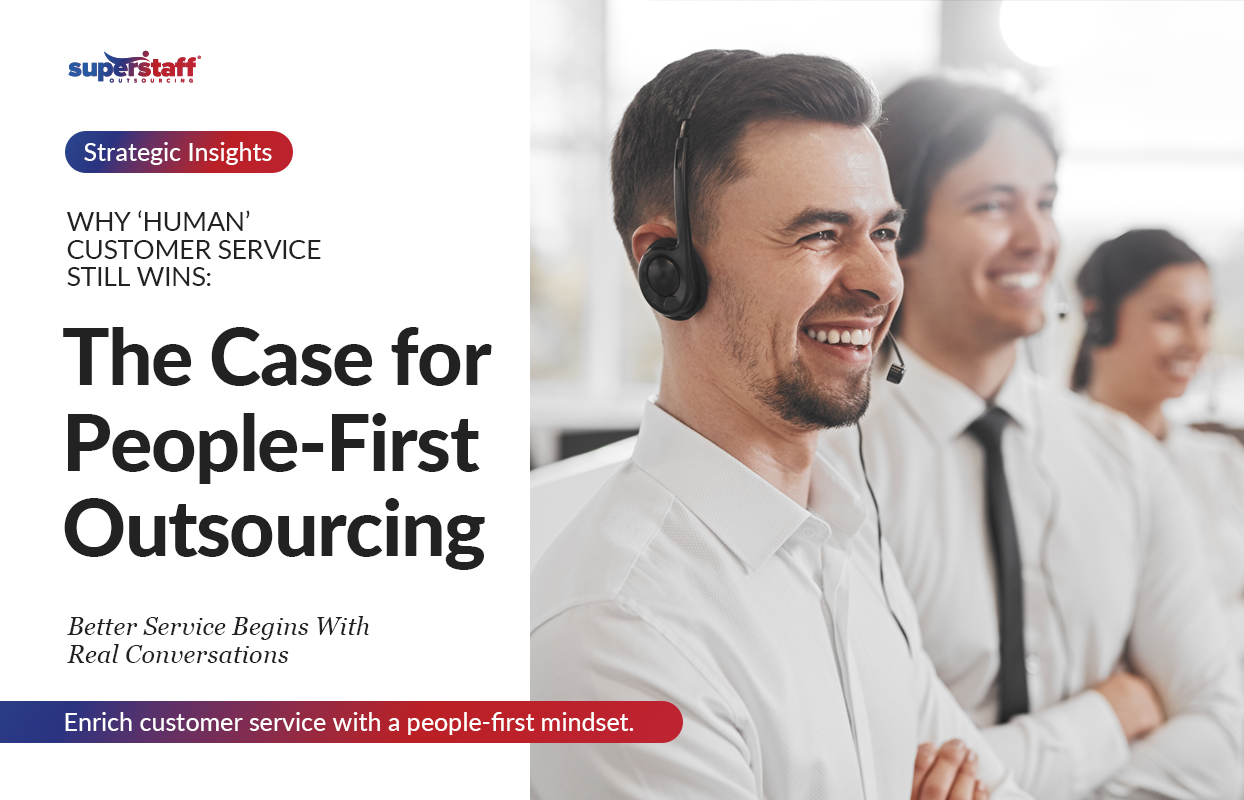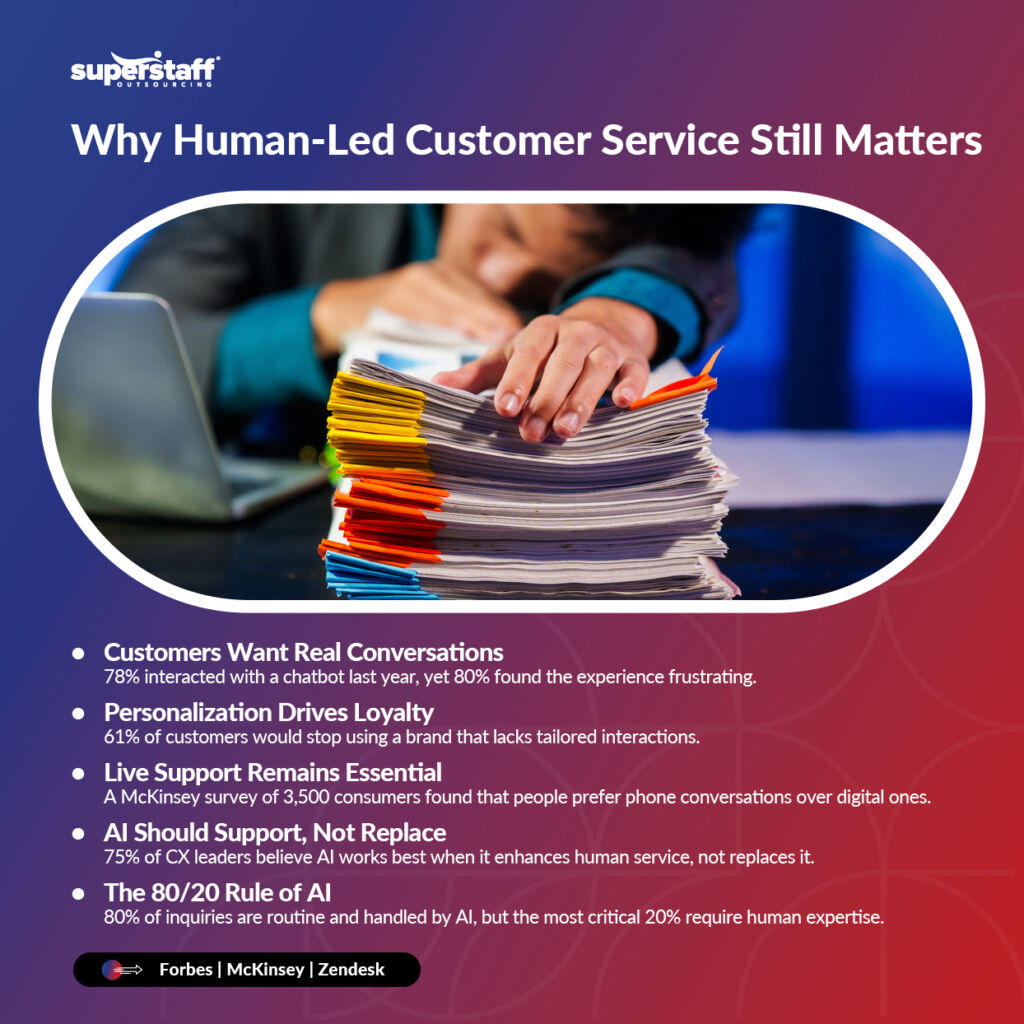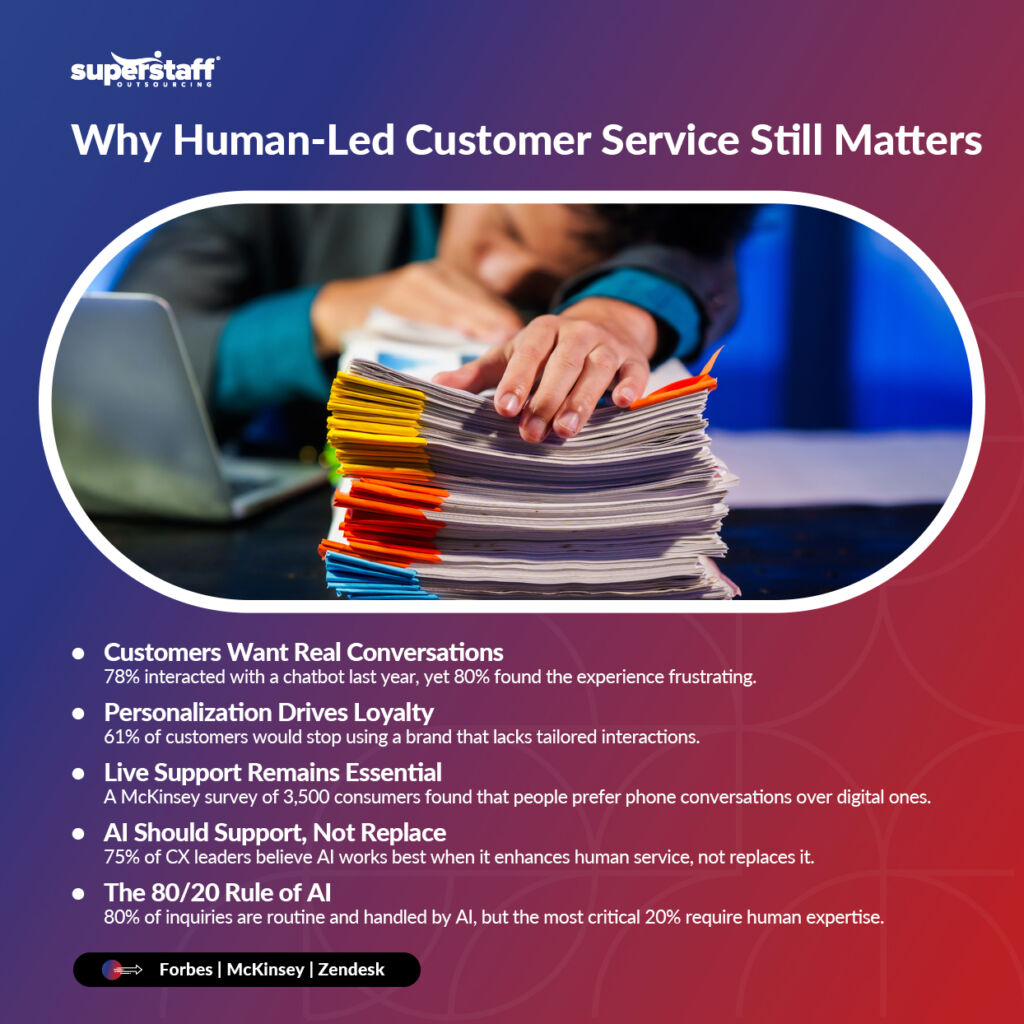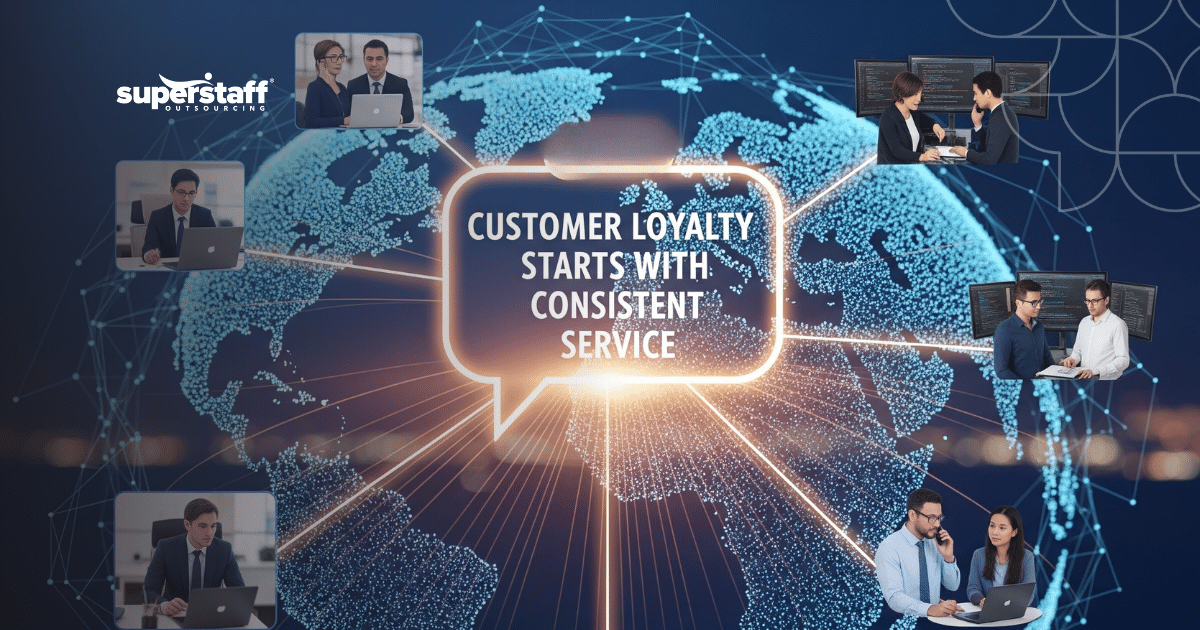
AI has revolutionized customer service, making interactions faster and more efficient.
Despite all the advancements, one thing remains unchanged: customers still prefer human customer service when they need support. No matter how sophisticated AI gets, it struggles to provide the empathy, critical thinking, real-time adaptability, and personal connection that only human agents offer.
As a business owner, you understand that handling complex customer interactions while relying solely on AI-driven solutions often leads to frustration. Your customers don’t just want resolutions or automated responses. They want to feel heard, understood, and valued. A people-first approach to customer service outsourcing strengthens relationships and drives long-term loyalty to your brand.
As you seek ways to scale operations while maintaining service quality, the challenge isn’t purely on using AI but on striking the right balance. The most successful organizations are blending AI with human expertise, ensuring that technology enhances the customer experience without replacing the human touch.
The question isn’t if human-led support is still relevant but why it remains essential in today’s competitive market. Let’s tackle that relevance.

The Limitations of AI-Driven Customer Service
Artificial intelligence has made significant strides in automating customer service, reducing response times, and handling high-volume inquiries. However, its limitations are becoming more apparent. According to Forbes, 78% of customers engaged with a chatbot over the past year, yet 80% found the experience frustrating rather than helpful.
While these capabilities enhance efficiency, they also expose critical shortcomings. AI lacks the emotional intelligence, adaptability, and nuanced decision-making that define great customer experiences. As you scale your business, relying too heavily on AI-driven interactions can create friction, frustrate customers, and ultimately erode your brand loyalty.
Where AI Falls Short
The Absence of Emotional Intelligence
AI can recognize keywords, detect sentiment, and provide scripted responses but does not truly understand human emotions. Customers seeking support often require empathy, reassurance, or a personalized touch, something an algorithm simply cannot provide. When a distressed customer is met with an automated response, it feels robotic rather than reassuring, leading to dissatisfaction and, in many cases, customer churn.
Lack of Contextual Awareness
AI models are trained to process data and follow structured decision trees but struggle with ambiguity, sarcasm, and layered meanings. A chatbot may misinterpret an inquiry, deliver irrelevant information, or fail to adjust responses based on past interactions. This limitation forces customers to repeat themselves or navigate frustrating loops, making the experience feel transactional rather than solution-oriented.
Increased Customer Frustration
Many businesses implement AI-driven solutions to improve efficiency, but over-reliance on automation can be counterproductive. Customers often feel unheard when they encounter rigid chatbot scripts or ineffective self-service options. This frustration escalates when there is no clear path to a human representative. Without a balance between automation and human-led support, you risk alienating your customer base rather than enhancing engagement.
Why Human Support Remains Essential
AI plays a valuable role in streamlining customer service operations but cannot operate in isolation. Businesses that prioritize efficiency over experience often find themselves dealing with higher churn rates and lower customer satisfaction scores.
Customers, especially in high-stakes industries like healthcare, financial services, and e-commerce, still expect real human support when facing complex issues. The key to success isn’t replacing human agents but strategically integrating AI to enhance, rather than diminish, the human connection.
The Value of Human Customer Service in Outsourcing
Efficiency is critical in customer service, but you cannot afford to sacrifice the human connection. Customers want meaningful interactions, thoughtful problem-solving, and reassurance when issues arise. Unlike AI, which follows scripted responses, human agents build trust, adapt to unique challenges, and provide personalized service that strengthens your customer relationships.
Why Human Agents Drive Better Customer Experiences
Establishing Trust and Strengthening Relationships
Customers are more likely to remain loyal when they feel valued. Speaking to a live agent fosters a sense of trust, showing customers that their concerns are handled by someone who genuinely understands their needs. Unlike AI-driven chatbots that offer preprogrammed responses, human representatives can personalize conversations, strengthening the brand’s emotional connection.
Research supports the need for genuine engagement. According to Forbes, 61% of customers would stop going to a brand that fails to deliver personalized experiences, highlighting how critical human-led interactions are to customer retention.
Similarly, a McKinsey survey consisting of 3,500 customers found that people still prefer live phone conversations for customer support. The preference for real human engagement underscores a simple truth: your customers want to be heard, not just processed through an automated system.
Advanced Problem-Solving and Critical Thinking
While AI can handle FAQs and transactional support, it struggles with nuanced or unexpected challenges. Human agents, on the other hand, apply logic, creativity, and situational awareness to resolve complex issues efficiently. They can ask follow-up questions, interpret customer intent, and adjust their approach based on the conversation’s context, which is something automation cannot replicate.
The Role of Emotional Intelligence in Customer Support
Customers often need reassurance. A trained agent can sense frustration, calm an upset customer, and provide thoughtful solutions that go beyond a generic script. The ability to empathize and respond appropriately is a key differentiator that sets human-led service apart.
Crisis Handling and Retention Strategy
When an issue escalates, whether it’s a lost order, a billing dispute, or a security concern, customers expect immediate, competent intervention. AI may be able to detect urgency, but only a human agent can navigate sensitive situations with diplomacy and judgment. Businesses that invest in skilled customer support teams prevent escalations from turning into customer losses, reinforcing loyalty even after a negative experience.
Balancing Efficiency with a People-First Outsourcing Model
If you want to scale, the challenge isn’t choosing between automation and human support. It’s about finding the right balance. With the right outsourcing partner, companies can combine technology-driven efficiency with the warmth and adaptability of skilled customer service teams, ensuring the best possible experience at every touchpoint.
How People-First Outsourced Customer Service Strikes the Right Balance
Outsourcing customer service is about optimizing operations while maintaining a high-quality customer experience. The most effective outsourcing strategies don’t replace human support with automation but use AI as an enhancer. As you get this balance right, you unlock greater efficiency, enhanced customer satisfaction, and a more substantial competitive advantage.
Building an AI-augmented, Human-Led Model
AI as a Support Tool, Not a Replacement
According to Zendesk, 75% of customer experience leaders agree that AI works best when it supports human services rather than replacing them. This reinforces the need to maintain easy access to live agents, ensuring that automation enhances service rather than making it impersonal.
The most effective outsourcing providers strike this balance by using AI to handle routine tasks while allowing human agents to focus on complex interactions. This approach enables you to scale efficiently without compromising the personalized service that fosters trust and long-term customer loyalty.
Advanced AI tools help by automating routine tasks such as sorting tickets, retrieving customer data, and offering initial responses to basic inquiries. This allows human agents to focus on high-value interactions that require critical thinking and emotional intelligence.
Instead of forcing customers through rigid chatbot loops, the best outsourcing models use AI to route inquiries intelligently, ensuring that customers connect with the right agent faster.
Investing in Training and Development for Outsourced Teams
A well-trained outsourced team delivers a service that feels like an in-house extension of the brand. The best outsourcing providers invest in soft skills training, problem-solving development, and continuous learning programs.
By prioritizing training, you can ensure that your outsourced agents uphold service quality and deliver consistent, brand-aligned experiences.
Delivering Personalized, Culturally Relevant Interactions
Outsourced teams that are trained in cultural nuances, regional preferences, and localized communication styles can offer a more engaging and practical service experience.
For global brands, this is particularly valuable. Your customers in the U.S. may have different expectations than those in Asia or Europe. Outsourced teams that understand these distinctions can adapt their approach, using culturally relevant examples, addressing concerns with sensitivity, and ensuring that communication feels authentic.
Personalization goes beyond language and culture. AI can provide agents with customer history, past interactions, and predictive insights, but the human agent turns that data into a meaningful conversation. Whether it’s remembering a returning customer’s preferences or adjusting tone based on sentiment, the ability to personalize interactions strengthens customer relationships and enhances loyalty.
According to Zendesk, about 80% of support inquiries tend to be repetitive and easily handled by AI, such as account balance lookups and password resets. The remaining 20% are more complex issues that require human intervention. Zendesk refers to this as the 80/20 rule to keep in mind to maintain the balance.
By blending AI with well-trained, culturally aware customer service teams, you can scale your operations without losing the personal touch that customers expect. The next step is understanding how this approach translates into real-world examples, proving that human-led customer service remains the gold standard in today’s experience-driven market.
Real-Life Examples: Brands Winning With Human-Centered Outsourcing
Investing in human-led customer service has proven to enhance customer loyalty and satisfaction across various industries. Let’s explore how leading companies have successfully implemented this approach:
E-commerce: Amazon’s Live Chat Support
Amazon, a global e-commerce leader, utilizes live chat agents to manage complex product inquiries. This personalized assistance helps their customers make informed purchasing decisions, significantly reducing cart abandonment rates. By offering real-time human interaction, Amazon ensures that customers feel valued and understood, leading to increased sales and customer retention.
Healthcare: Mayo Clinic’s Compassionate Patient Support
The Mayo Clinic has outsourced certain aspects of its patient support and medical billing services to specialized teams trained in empathetic communication. These teams compassionately handle patient inquiries, ensuring that individuals feel cared for during stressful times. This approach streamlines administrative processes and enhances patient satisfaction with the healthcare provider.
Fintech: PayPal’s Fraud Resolution with a Human Touch
PayPal employs customer service teams dedicated to fraud resolution, emphasizing personalized interactions. When users encounter potential fraud, they can speak directly with knowledgeable agents who provide tailored assistance, ensuring concerns are addressed promptly and empathetically. This human-centered approach reinforces user trust and loyalty to PayPal’s services.
Travel & Hospitality: Marriott’s Personalized Guest Assistance
Marriott International offers personalized assistance through its customer service centers, where agents provide tailored support to guests. Whether handling booking inquiries or resolving issues during stays, these agents deliver culturally relevant and localized support. This commitment to personalized service enhances guest experiences and bolsters Marriott’s brand reputation.
These examples illustrate that customer service outsourcing, centered on human interaction, serves as a powerful relationship-building tool rather than merely a cost-saving measure. By prioritizing human-led support, you can foster deeper connections with your customers, leading to sustained loyalty and competitive advantage.
Looking ahead, it’s clear that integrating human-centric strategies into customer service outsourcing will be pivotal for companies seeking to thrive in an increasingly competitive market.
Best Practices for Implementing People-First Customer Service Outsourcing

Outsourcing customer service is focused on ensuring that your customer interactions reflect your company’s values, build trust, and strengthen relationships. A strategic, people-first outsourcing approach ensures you maintain high service quality while scaling efficiently.
Success depends on selecting the right partners, integrating AI without losing the human touch, investing in continuous training, and closely monitoring performance if you’re looking to outsource. Here’s how you can implement a customer service outsourcing model that prioritizes people while leveraging technology for efficiency.
Key Strategies for a Human-Centric Outsourcing Model
Selecting the Right Outsourcing Partner
The foundation of a strong outsourcing strategy starts with choosing the right provider. You must assess potential partners beyond cost savings. The ideal outsourcing provider should:
- Demonstrate a strong customer service culture aligned with the brand’s values.
- Provide well-trained agents with experience in the company’s industry.
- Have a proven track record of delivering high customer satisfaction scores.
- Offer flexibility and scalability to grow alongside your business.
A misaligned outsourcing partnership can negatively impact customer experiences and brand reputation. Conducting due diligence, such as reviewing client testimonials, requesting case studies, and analyzing quality assurance processes, ensures you make informed decisions.
Investing in Continuous Training and Soft Skills Development
Even the most advanced AI cannot replicate the power of human conversation. Customer service agents must have technical knowledge and the soft skills necessary to engage customers effectively. Investing in ongoing training ensures that outsourced teams remain aligned with brand expectations and service standards.
Effective training programs should focus on:
- Brand Immersion: Agents should deeply understand your company values, messaging, and customer expectations.
- Scenario-Based Learning: Preparing agents for real-world interactions, including handling complicated customer concerns with empathy and efficiency.
- Communication and Soft Skills Development: Enhancing active listening, problem-solving, and emotional intelligence.
- AI Utilization Training: Helping agents use AI tools effectively without diminishing the human element of service.
When businesses invest in training, they transform outsourced teams into true brand representatives rather than just service providers.
Continuous Performance Monitoring and Optimization
The success of an outsourced customer service model depends on maintaining high-quality interactions at scale. You must track key performance metrics to ensure that outsourcing delivers both efficiency and a superior customer experience.
Essential performance indicators include:
- Customer Satisfaction (CSAT) Scores: Measures how well customer needs are met.
- First Call Resolution (FCR): Assesses the ability of your agents to resolve issues in a single interaction.
- Average Handling Time (AHT): Ensuring efficiency without compromising personalization.
- Quality Assurance Audits: Regularly reviewing interactions to maintain service excellence.
Leading outsourcing providers offer real-time reporting, customer sentiment tracking, and quality monitoring to help businesses continuously optimize service delivery.
A people-first outsourcing model creates lasting relationships, builds brand trust, and strengthens the foundation for future growth. The next step is understanding how you can align outsourcing with your long-term customer experience goals, ensuring that service quality remains uncompromised at every expansion stage.
Uphold the Future of Human Customer Service With SuperStaff
AI makes customer service faster, but real connections keep your customers coming back. People want quick answers, and they want to feel heard. Blending AI with human-led support creates stronger relationships, builds trust, and drives loyalty. Outsourcing lets you scale without losing the personal touch. The key is choosing a partner that values service quality and flexibility.
SuperStaff can help you build high-performing teams that deliver empathetic, brand-aligned support 24/7. We specialize in people-first outsourcing solutions, helping you build high-performing customer service teams without sacrificing personalization.
With a workforce trained in empathy, problem-solving, and brand alignment, we ensure that every customer interaction reinforces trust and strengthens relationships. Our flexible outsourcing models allow you to scale seamlessly, offering 24/7 support while keeping the human element at the forefront of your services.
If your business is looking for a customer service outsourcing partner that blends technology with human expertise, SuperStaff is here to help. Connect with us today to learn how we can support your growth with a flexible, people-first outsourcing strategy.






